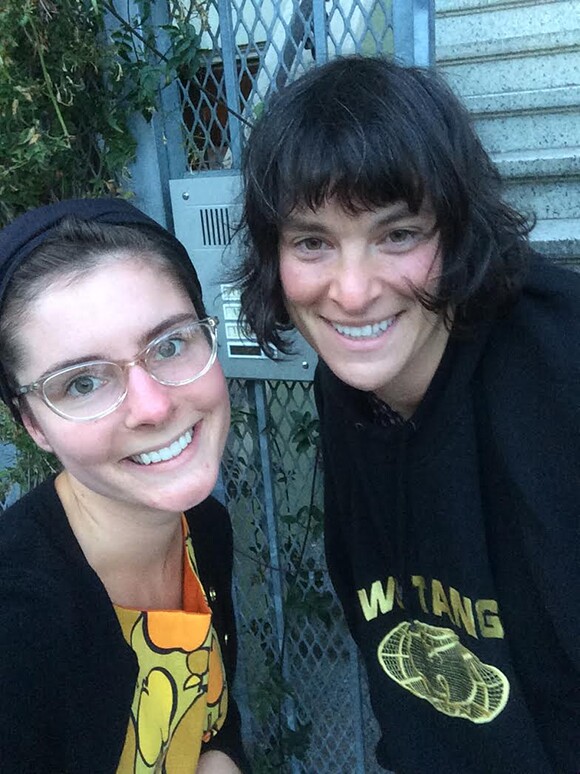Miranda July: Looking for Somebody

Somewhere, somebody is looking for you. They are waiting at a café on Sunset Boulevard, gazing at the screen of their smartphone, anticipating the tiny ding of a bell that lets them know a message is waiting. They are using Miranda July's new iOS app Somebody, co-created with support from Miu Miu. In a modern world characterized by permascreen-gaze, Somebody offers incentive for connection in real-life and real-time, nudged along by serendipity. It's a characteristic of July's distinct creative oeuvre.
"Somebody is very related to other work I've done that elicits performance from the public and art making," says Miranda July when I reached her by phone. "I am making a script for other people to say ideally in ways that include some of their own voice and story, and provide context and impetus of that."
July launched the app on August 28 at the Venice Film Festival, accompanied by a 10-minute short movie about a few possible interactions that could happen when using the app.
Using the app, one sends their message out into the floating Somebody universe with the hopes that a person nearby will deliver it to the intended recipient. If this person is ready to receive the message, a surrogate will deliver it.
After a user downloads it, they are shown the other people from their mobile contacts -- not social media "friends" -- that have also downloaded the app.
Unlike location-based check-in apps like Foursquare, there are no badges to earn or points to receive. Somebody is not a game -- it's a public performance, and a way to connect.

Caroline Anderson, a 24-year-old writer, delivered and received two messages shortly after downloading the app.
"I just had one friend on the app who I work with and am pretty close to," says Anderson. "I sent her a message: 'let's get brunch.' Within the hour it had been delivered."
In moments like this, the interaction between a complete stranger delivering a personal message could be fascinating, jarring, or just plain bizarre. It's also freeing to revel in this state of not knowing whether or not the message will ever be delivered. Caroline's friend received the message; she texted Caroline later to let her know that a girl jogging by somewhere in Silver lake had dropped it off. Somebody becomes a curious mode of communication because of the way the app creates new ways to converse.

"Each messaging system elicits a new style of writing," July says. "We've all learned that when you're texting you have to use more exclamation points or people think you are mad at them, or use hashtags on Twitter. I am excited that this Somebody app is essentially scriptwriting, which most people wouldn't have a reason to do or think about."
On the not-writerly technology end of this, location-based apps are nothing new. Tinder and Grinder offer any person with a smartphone the opportunity to locate people in a specific radius for dating, hooking up, hanging out, or conversation. With both of these apps, the objective is romantic or sexual in nature. Neither Tinder nor Grinder elucidates moments of immediate synchronicity that July's Somebody app does.
These moments are reminiscent of July's 2005 film "Me and You and Everyone We Know," which follows a web of characters through a series of emotional connections. The Somebody app calls to mind the famous internet chat scene in that film, where a lonely contemporary art curator and a six-year-old boy exchange online texts that describe how they will poop back and forth into each others' butts forever. Neither the curator nor the boy know each other's real identities, lending an internet anonymity that offers them a freedom to say whatever without fear. The Somebody app doesn't have a pre-determined narrative, which is something that July notes as a departure from her previous work.


"Just the whole creative process of apps -- they are iterative, and continue to transform," she says. "That's not how movies or books or most things I make are."
The Somebody app is still in its early phase. Ultimately, July is interested in the users who stick around and get into the writing opportunities that it offers. In this sense, the app becomes less about actually finding somebody, and more about becoming somebody to someone else.
"I think it's super empowering to get to control not just what someone says, but how they say it," says July. "This may get too arty for a lot of the audience who just want to send 'wussup,' but I also think the 'wussup' messages are not going to get delivered. I think that's just too much trouble. The base of users that stays talk about how things are really well written."
July will present Somebody at LACMA's Art + Technology Lab on September 11, offering a demonstration of the app and a discussion about the project. LACMA will become a Somebody hotspot, and anyone who downloads it can test it out for free. She will speak about Somebody on October 9 at the New Museum in New York.
Dig this story? Sign up for our newsletter to get unique arts & culture stories and videos from across Southern California in your inbox. Also, follow Artbound on Facebook, Twitter, and Youtube.